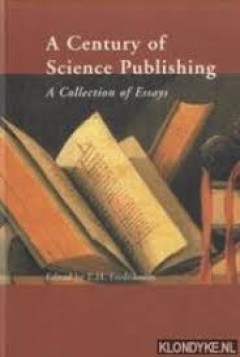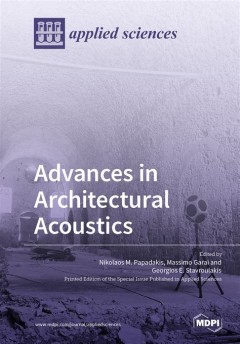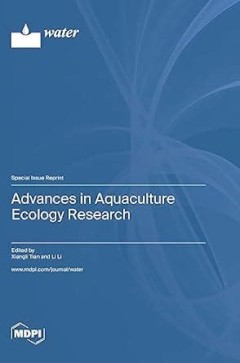Filter by

A Century of Science Publishing - A Collection of Essays
Leading publishers and observers of the science publishing scene comment in essay form on key developments over the past century. The scale of the global research effort and its industrial organisation have resulted in substantial increases in the published volume, as well as new techniques for its handling. The former languages of science communication, like Latin and German, have given way to…
- Edition
- -
- ISBN/ISSN
- 9781586031480
- Collation
- 320 hlm
- Series Title
- -
- Call Number
- -

Advances in Ascochyta Research
Legume crops provide an excellent source of high quality plant protein and have a key role in arable crop rotations reducing the need for fertilizer application and acting as break-crops. However, these crops are affected by a number of foliar and root diseases, being ascochyta blights the most important group of diseases worldwide. Ascochyta blights are incited by different pathogens in the va…
- Edition
- -
- ISBN/ISSN
- 9782889456345
- Collation
- 195 hlm; ill., lamp.,
- Series Title
- -
- Call Number
- -

Advances in Artificial Intelligence: Models, Optimization, and Machine Learning
The present book contains all the articles accepted and published in the Special Issue "Advances in Artificial Intelligence: Models, Optimization, and Machine Learning" of the MDPI Mathematics journal, which covers a wide range of topics connected to the theory and applications of artificial intelligence and its subfields. These topics include, among others, deep learning and classic machine le…
- Edition
- -
- ISBN/ISSN
- 9783036545165
- Collation
- 362 hlm; ill., lamp.,
- Series Title
- -
- Call Number
- -

Advances in Artificial Intelligence and Statistical Techniques with Applicati…
The present reprint contains all of the articles accepted and published in the Special Issue " Advances in Artificial Intelligence and Statistical Techniques with Applications to Health and Education" from the MDPI journal Mathematics. This Special Issue aims to develop more efficient and effective approaches to healthcare and education, leveraging the increasing availability of big data and ad…
- Edition
- -
- ISBN/ISSN
- 9783036572475
- Collation
- 406 hlm; ill., lamp.,
- Series Title
- -
- Call Number
- -

Advances in Artificial and Biological Membranes: Mechanisms of Ionic Sensitiv…
Ion-sensitive membrane-based sensors and ionic processes in bio-membranes are the focus of this book. The chapters are carefully chosen to characterize essential research trends, applications, and perspectives. They include solid contact ion-selective and reference electrodes and their electroanalytical behavior in zero and nonzero-current modes, planar and miniaturized multielectrode platforms…
- Edition
- -
- ISBN/ISSN
- 9783036510712
- Collation
- 153 hlm; ill., lamp.,
- Series Title
- -
- Call Number
- -

Advances in Architectural Acoustics
Satisfactory acoustics is crucial for the ability of spaces such as auditoriums and lecture rooms to perform their primary function. The acoustics of dwellings and offices greatly affects the quality of our life, since we are all consciously or subconsciously aware of the sounds to which we are daily subjected. Architectural acoustics, which encompasses room and building acoustics, is the scien…
- Edition
- -
- ISBN/ISSN
- 9783036542966
- Collation
- 356 hlm; ill., lamp.,
- Series Title
- -
- Call Number
- -

Advances in Aquatic Invertebrate Stem Cell Research
This publication is based upon work from COST Action '16203 MARISTEM Stem cells of marine/aquatic invertebrates: from basic research to innovative applications', supported by COST (European Cooperation in Science and Technology).COST (European Cooperation in Science and Technology) is a funding agency for research and innovation networks. Our Actions help connect research initiatives across Eur…
- Edition
- -
- ISBN/ISSN
- 9783036516356
- Collation
- 396 hlm; ill., lamp.,
- Series Title
- -
- Call Number
- -

Advances in Aquaculture Ecology Research
The discipline of aquaculture ecology is developing rapidly and has generated much valuable progress in recent decades. This reprint mainly describes the recent advances in the individual ecology of commercial aquatic organisms, the ecology of aquaculture systems, the interaction between aquaculture activities and the environment, the structure of function of microbial communities, the principl…
- Edition
- -
- ISBN/ISSN
- 9783036579757
- Collation
- 180 hlm; ill., lamp.,
- Series Title
- -
- Call Number
- -

Advances in Antimicrobial Coatings
This book is motivated by our passion to compile recent research on antimicrobial surfaces. We aimed to assemble research papers on the preparation of new materials, antimicrobial testing using different pathogens (bacteria, fungi, and viruses), and the relationship between the coating nanostructure and its reactivity towards the studied pathogen(s). We believe that a good antimicrobial coating…
- Edition
- -
- ISBN/ISSN
- 9783036510071
- Collation
- 166 hlm; ill., lamp.,
- Series Title
- -
- Call Number
- -

Advances in Antifungal Development: Discovery of New Drugs and Drug Repurposing
This reprint describes recent advances made in the field of antifungal development, especially the discovery of new drugs and drug repurposing. The articles presented in this book provide useful information and insight for the development of new antifungal drugs or intervention strategies. The identification of new, safe molecules, and cellular targets, as well as the elucidation of their antif…
- Edition
- -
- ISBN/ISSN
- 9783036547671
- Collation
- 282 hlm; ill., lamp.,
- Series Title
- -
- Call Number
- -
 Computer Science, Information & General Works
Computer Science, Information & General Works  Philosophy & Psychology
Philosophy & Psychology  Religion
Religion  Social Sciences
Social Sciences  Language
Language  Pure Science
Pure Science  Applied Sciences
Applied Sciences  Art & Recreation
Art & Recreation  Literature
Literature  History & Geography
History & Geography